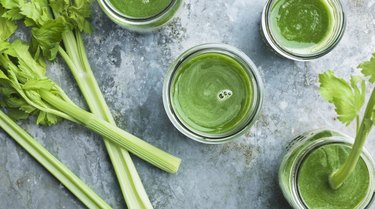
The popularity of fad diets persists because these diets promise impossibly quick weight loss. The water and celery diet may be a low-calorie way to lose some weight; however, eating only celery and drinking only water can leave you in a weakened nutritional state. Once you understand the limitations of this fad diet, learn how you can reasonably include both celery and water in your diet.
Achieving Negative Calorie Balance
Video of the Day
The low-calorie nature of celery, along with calorie-free water, places them in the category of "negative-calorie" foods, meaning you may burn more calories digesting them than they actually contain, according to Mayo Clinic physician Donald Hensrud. Hensrud explains that trying to lose weight by focusing on possibly negative-calorie foods inhibits your ability to eat a balanced diet. Although drinking water is necessary to your health, water gives your body no calories, vitamins or minerals.
Video of the Day
Too Few Calories and Fats
As you lose weight, you need at least 1,200 calories to stay healthy if you are a woman, and 1,600 calories if you are a man, according to the National Institutes of Health. Eating 1,200 or 1,600 calories in celery alone, besides being unhealthy, would be almost impossible. To eat 1,200 calories or 1,600 calories, you would need to eat 75 to 100 cups of raw celery every day. Celery has only a trace amount of fat, as 1 cup contains just 0.17 grams, and 100 cups contain 17 grams. Your body needs fat to process nutrients and give you energy. Plain water contains no calories or fat.
Lacking in Nutrients
A 1-cup serving of celery has less than 1 grams of protein, 1.9 grams of natural sugar and 1.6 grams of fiber. While you need between 22 and 34 grams of fiber per day, if you ate enough calories in celery to sustain you, you could consume about three to four times more fiber than necessary. Celery also has 40 milligrams of calcium per cup and 81 milligrams of sodium. If you are dieting, you may be limiting your sodium to the American Heart Association's 1,500-milligram recommendation. Eating celery all day long may cause you to consume an excess of sodium.
Celery also contains 36 micrograms of folate, 3.1 milligrams of vitamin C and 453 International Units (IU) of vitamin A per cup. If you eat 20 cups of celery, you would consume 9,060 IU of vitamin A, far above the recommended amounts of 3,000 IU for men and 2,310 IU for women. Excess vitamin A may be a factor in osteoporosis, according to the National Institutes of Health. While water is healthy, it provides your body with few vitamins or minerals.
Healthy Weight-Loss Strategies
Avoid using only celery and water while dieting, and instead plan on including the vitamin-rich vegetable in your balanced weight-loss diet plan, which she include a variety of foods from all the food groups and enough calories to meet your nutrient needs.
Add peanut butter to raw celery sticks for a snack with both healthy fats and protein; dip celery sticks in Greek yogurt mixed with onions and herbs; and add celery to salads and soups. You can juice raw celery with apples and spinach for a healthy drink. Water can help your weight loss efforts, as drinking water adds to your feeling of fullness, which can help you control calorie intake.
Read more: The Health Benefits of Raw Celery Juice
Detoxing With Celery Juice
Like the water and celery diet, celery juice is more hype than fact. According to the proponents of the celery juice detox, you must drink 16 ounces of celery juice on empty stomach first thing in the morning, which supposedly improves absorption and digestion. The celery juice testimonials claim that drinking the celery water improves energy, digestion, mood, and concentration.
But there's no evidence to support these claims, according to registered dietitian Kristen Kirkpatrick at the Cleveland Clinic, and drinking celery juice, or any other type of detox juice or diet, won't improve your body's natural detoxification system: your liver and kidneys. It's OK to drink celery juice every once in a while, but it's not a miracle cure as claimed.
- Mayo Clinic: "Negative Calorie Foods: Diet Gimmick or Weight-Loss Aid?"
- USDA Nutrient Data Laboratory: "Celery, Raw"
- National Institutes of Health: "Dietary Fats"
- National Institutes of Health: "Vitamin A and Carotenoids"
- USDA Nutrient Database: "Beverages, Water, Tap, Drinking"
- National Institutes of Health: "Healthy Eating Plan"
- American Heart Association: "Why Should I Limit Sodium?"
- Cleveland Clinic: "Celery Juice Is a Trendy Detox Drink, But Does It Actually Have Benefits?"